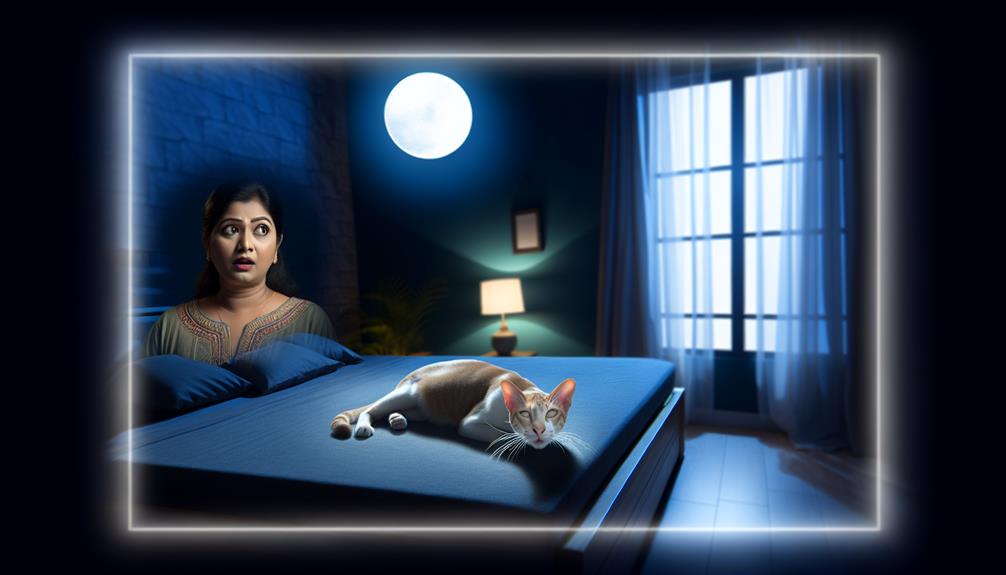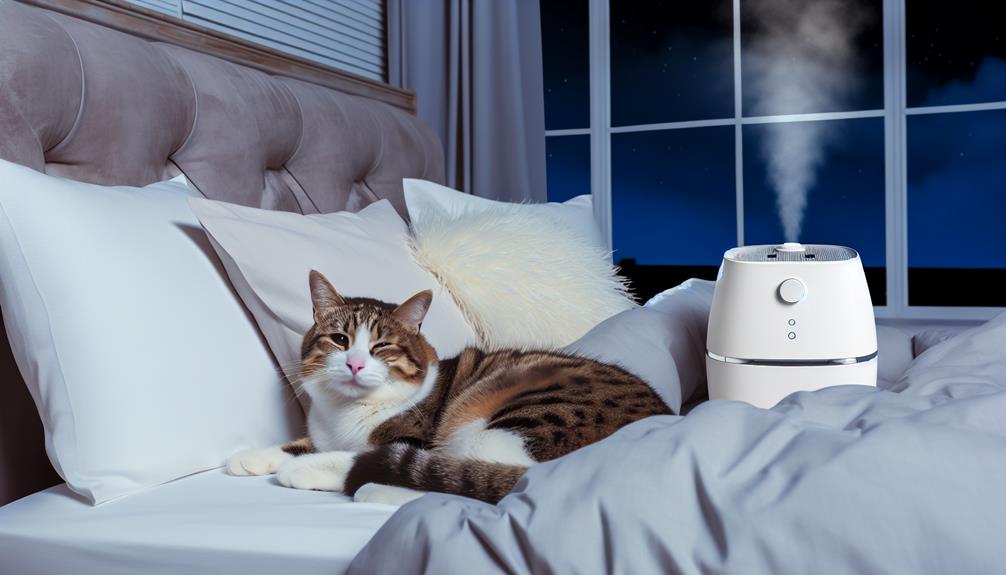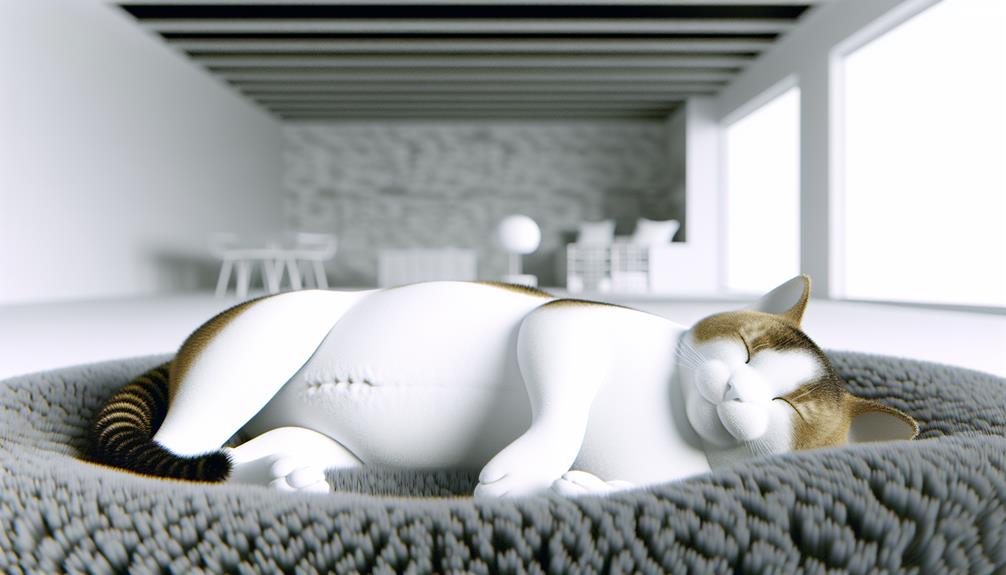You might think snoring is reserved for humans or perhaps even a particularly loud dog, but did you know that your feline friend might also be part of this nocturnal chorus? Yes, cats can snore, and while it's usually harmless, there are instances where it might signal something more concerning. Imagine the peaceful scene of a cat curled up in its favorite spot, only for you to hear a soft, rhythmic noise. Why do some cats snore and others don't? And when should you be worried about their snoring? Let's explore this intriguing aspect of cat behavior.
What Is Cat Snoring?
Cat snoring is a phenomenon where a cat produces a sound during sleep due to the vibration of relaxed tissues in the upper airway. It's not uncommon and can be quite similar to what you'd observe in humans. When your cat is in deep sleep, particularly during the rapid eye movement (REM) phase, the muscle tone in the upper airway decreases. This relaxation can cause tissues such as the soft palate and pharynx to vibrate, producing the characteristic snoring sound.
Understanding cat sleep is vital for recognizing why snoring occurs. Cats have polyphasic sleep patterns, meaning they sleep multiple times throughout the day. On average, a cat can sleep anywhere between 12 to 16 hours in a 24-hour period. During these sleep cycles, cats go through various stages, including light sleep, deep sleep, and REM sleep. Snoring is most likely to occur during the REM stage, where muscle relaxation is at its peak.
Feline habits also play a role in snoring. Certain sleep positions can exacerbate the likelihood of snoring. For instance, if your cat sleeps on its back with its head tilted at a particular angle, the airway is more likely to be partially obstructed, leading to snoring. Additionally, some breeds are predisposed to snoring due to anatomical features such as shorter nasal passages.
While occasional snoring in cats can be normal, it's important to monitor for any changes in frequency or intensity. Persistent or loud snoring might warrant a closer look, but generally, a snoring cat is simply experiencing a relaxed and deep slumber.
Common Causes
Several factors can contribute to snoring in cats, with anatomical and physiological attributes playing a significant role. Understanding these underlying causes can help dispel common snoring myths and enable you to better assess your cat's health.
- Anatomical Structure: Brachycephalic breeds, such as Persians and Himalayans, are predisposed to snoring due to their shortened nasal passages and compressed facial structures. These anatomical traits can cause a partial obstruction of the airway, leading to the characteristic snoring sound.
- Obesity: Excess body weight can exacerbate snoring in cats. Fat deposits around the neck and throat can constrict the airway, making it more difficult for your cat to breathe smoothly during sleep. Maintaining a healthy weight is essential to minimizing this risk.
- Allergies and Respiratory Infections: Environmental allergens or upper respiratory infections can cause inflammation and congestion in your cat's nasal and throat passages. This swelling can reduce the airway's diameter and increase the likelihood of snoring. If your cat has a history of allergies or frequent respiratory infections, this may be a contributing factor.
- Sleep Positions: The position in which your cat sleeps can affect snoring. Cats that sleep in a supine position (on their back) are more likely to snore due to gravity causing the soft tissues in the throat to collapse slightly. Observing and adjusting your cat's sleep positions may help reduce snoring.
Debunking snoring myths and recognizing these common causes can provide insight into your cat's nocturnal noises. This knowledge enables you to take proactive steps towards ensuring your feline friend's ideal respiratory health.
When to Worry

While occasional snoring in cats can be attributed to benign causes like sleeping position or mild respiratory congestion, you'll need to recognize signs of distress such as labored breathing, nasal discharge, or changes in vocalization. Persistent snoring accompanied by these symptoms may indicate underlying health issues, including respiratory infections, obesity, or anatomical abnormalities. It's essential to seek veterinary advice to guarantee your cat receives appropriate care and treatment.
Common Causes Explained
Among the various reasons that can cause a cat to snore, understanding the common causes is essential in determining when it's time to be concerned. Many pet owners fall victim to snoring myths, attributing these sounds to benign factors without considering underlying health issues. Snoring in cats can be due to several factors, and recognizing these can help you differentiate between harmless and worrisome snoring.
- Obesity: Excess weight can lead to fat accumulation around the neck and throat, causing airway obstruction. This often results in snoring with a distinct, wheezy sound.
- Nasal Congestion: Allergies, infections, or foreign bodies can cause nasal congestion. The sound differences here include more nasally snoring, sometimes accompanied by sneezing or nasal discharge.
- Brachycephalic Syndrome: Breeds with shortened skulls, such as Persians, often have anatomical abnormalities that lead to chronic snoring. Their snoring is typically more pronounced and regular.
- Sleeping Position: Sometimes, a cat's snoring is simply due to an awkward sleeping position that temporarily narrows the airways. This type of snoring is usually intermittent and resolves when the cat repositions itself.
Understanding these causes helps you know when to seek veterinary advice, ensuring your cat's well-being.
Signs of Distress
It's vital to recognize signs of distress in your cat's snoring to determine when veterinary intervention is necessary. Pay close attention to your cat's behavior and any accompanying stress signals. If you notice changes in their snoring pattern—such as increased frequency, volume, or irregular breathing—these could be indicative of underlying health issues. Labored breathing, coughing, or wheezing might suggest respiratory distress or cardiovascular problems.
Observe your cat for additional signs of distress, like lethargy, decreased appetite, or uncharacteristic hiding. Behavioral changes often signify discomfort or pain. If your cat appears agitated, with rapid, shallow breaths, or shows signs of cyanosis—bluish gums or tongue—this requires immediate attention.
Examine other stress signals too. If your cat is grooming excessively, vocalizing unusually, or displaying aggressive behavior, these might be responses to discomfort caused by snoring-related issues. Increased sneezing or nasal discharge can also point to upper respiratory infections or obstructions.
Understanding these signs of distress helps you better monitor your cat's overall health. Recognizing when your cat's snoring deviates from their norm is vital for timely veterinary evaluation, ensuring they receive the best possible care.
Seeking Veterinary Advice
Recognizing signs of distress in your cat's snoring is only the first step; knowing when to seek veterinary advice is equally important. While occasional snoring can be harmless, persistent or severe snoring may indicate underlying health issues that require immediate attention. A vet consultation is essential to guarantee your cat's well-being.
Here are key indicators that warrant professional evaluation:
- Changes in Snoring Patterns: If your cat's snoring becomes louder, more frequent, or changes in tone, it could be a sign of respiratory issues or nasal obstructions.
- Difficulty Breathing: Labored breathing, wheezing, or gasping for air alongside snoring necessitates urgent veterinary care, as these symptoms may indicate upper respiratory infections or asthma.
- Behavioral Changes: Lethargy, decreased appetite, or irritability accompanying snoring can signify broader systemic problems affecting feline health.
- Physical Symptoms: Presence of nasal discharge, coughing, or sneezing in conjunction with snoring could point to infections or allergic reactions.
Prompt vet consultation helps in diagnosing conditions like sleep apnea, obesity, or other serious ailments. Early intervention can considerably enhance your cat's quality of life. Never disregard persistent or unusual snoring—your cat's health may depend on timely veterinary attention.
Breeds Prone to Snoring
Did you know that certain cat breeds are more prone to snoring than others? This isn't just an anecdotal observation but is supported by veterinary science. For instance, the Persian breed is well-documented for its predisposition to respiratory issues, including snoring. This is largely due to their brachycephalic (short-nosed) anatomy, which can lead to obstructed airways and consequently, increased snoring.
Similarly, Siamese cats, despite their sleek appearance, can also exhibit snoring. Siamese snoring is often attributed to their elongated nasal passages and potential for congenital respiratory anomalies. While these conditions aren't necessarily harmful, they can make a noticeable difference in their breathing patterns during sleep.
It's vital to understand that snoring in these breeds isn't merely a benign trait but can be indicative of underlying anatomical variances that affect respiratory function. Research has shown that brachycephalic breeds like Persians have a higher incidence of airway resistance, contributing to their characteristic snoring sounds.
In contrast, Siamese cats might develop snoring due to narrower nasal passages, which can increase turbulence as air moves through their respiratory system. Studies also suggest that the muscle tone in their upper airways can play a role, making them more susceptible to snoring when they're relaxed or in deep sleep stages.
Understanding these breed-specific predispositions can help you better manage and monitor your cat's health. Regular veterinary check-ups are important to guarantee that snoring isn't a sign of more severe respiratory issues. By staying informed, you can provide a comfortable and healthy environment for your feline companion.
Diagnosing Health Issues

When evaluating your cat's snoring, it's essential to identify any patterns and frequency, as these can indicate underlying health issues. Common causes include obesity, respiratory infections, and anatomical abnormalities. If your cat's snoring is persistent or accompanied by other symptoms, consult a veterinarian for a thorough evaluation and appropriate intervention.
Identifying Snoring Patterns
To accurately identify snoring patterns in cats and diagnose potential health issues, it's important to observe the frequency, duration, and intensity of the snoring sounds. Understanding these details can help you differentiate between normal snoring and signs of underlying medical conditions.
First, it's vital to debunk some common snoring myths. Not all snoring is harmless; while some may be benign, persistent or loud snoring could indicate respiratory issues or other health problems.
Next, consider your cat's sleep stages. Cats, like humans, have different phases of sleep, including REM and non-REM sleep. Snoring often occurs during deeper sleep stages, so noting when the snoring happens can provide valuable insights.
Here's how to systematically observe your cat's snoring patterns:
- Frequency: Track how often your cat snores. Is it nightly or sporadic?
- Duration: Measure the length of each snoring episode. Does it last a few seconds or several minutes?
- Intensity: Note how loud the snoring is. Is it faint or does it resonate throughout the room?
- Accompanying Symptoms: Look for other signs like coughing, sneezing, or difficulty breathing.
Common Causes of Snoring
Understanding the common causes of snoring in cats is essential for diagnosing potential health issues. Snoring in felines can stem from various factors impacting their cat health. Obesity is a primary cause; excess fat can obstruct the upper respiratory tract, altering your cat's sleep habits. Breed disposition also plays a significant role, particularly in brachycephalic breeds like Persians and Himalayans, which have shortened nasal passages prone to blockages.
Another common cause is respiratory infections, such as feline viral rhinotracheitis or chronic rhinitis, leading to inflammation and narrowing of the airways. Allergic reactions to environmental irritants like pollen, dust, or cigarette smoke can similarly trigger snoring by causing nasal congestion. Polyps or tumors within the nasal passages or throat also present obstructions, altering normal airflow and producing snoring sounds.
Dental diseases, including abscesses or gum inflammation, can extend to the nasal region, contributing to snoring. Additionally, anatomical abnormalities, such as elongated soft palates, can disrupt airflow. Finally, certain medications may induce relaxation of the throat muscles, exacerbating snoring.
When to Consult Veterinarian
Recognizing the common causes of snoring in your cat can guide you in deciding whether professional consultation is necessary. While occasional snoring is often benign, it's essential to differentiate between harmless causes and potential health issues. Here's when you should consult a veterinarian:
- Persistent Snoring: If your cat's snoring becomes frequent or persistent, it may indicate an underlying issue such as obesity, which can restrict airways and compromise healthy breathing.
- Behavioral Changes: Lethargy, decreased appetite, or altered behavior alongside snoring could signal respiratory infections or other systemic health conditions.
- Difficulty Breathing: Labored breathing, wheezing, or any signs of respiratory distress should never be ignored. These symptoms could be indicative of asthma, allergies, or even more severe conditions like tumors.
- Snoring Myths: Don't rely on common snoring myths that suggest snoring is always harmless. Veterinarians can provide an accurate diagnosis through a thorough examination and possibly imaging studies.
Consulting with a veterinarian guarantees that any serious conditions are diagnosed and treated promptly, maintaining your cat's overall well-being. Remember, healthy breathing is essential for your cat's quality of life, and timely veterinary intervention can make all the difference.
Managing Snoring
Managing your cat's snoring involves several evidence-based strategies. First and foremost, consider the sleep environment. Cats, like humans, may snore more if their sleeping area isn't ideal. Make certain your cat's bed is well-ventilated and free from allergens. Elevated beds can sometimes improve airflow, reducing the likelihood of snoring.
One of the most effective snoring solutions is weight management. Obesity is a common cause of snoring in cats, as excess fat can obstruct the airway. A balanced diet, rich in essential nutrients, coupled with regular exercise, can alleviate this issue. Consult your veterinarian for a tailored nutritional plan.
Another critical aspect is evaluating your cat's sleeping position. Cats that sleep with their heads elevated are less likely to snore. Consider using a small pillow or a specially designed pet bed that encourages this posture. Additionally, certain snoring solutions involve environmental adjustments, such as using a humidifier to maintain ideal humidity levels. Dry air can irritate the nasal passages, exacerbating snoring.
It's also worth examining your cat's overall health. Conditions like respiratory infections or dental issues can contribute to snoring. Regular veterinary check-ups can help identify and treat these problems early. In some cases, your vet might recommend specific interventions, such as antihistamines for allergies or minor surgical procedures to remove obstructions.
Lastly, be mindful of your cat's breed. Brachycephalic breeds, such as Persians, are predisposed to snoring due to their facial structure. While you can't change their anatomy, understanding their unique needs can help you manage their snoring more effectively. By optimizing the sleep environment and addressing underlying health issues, you can greatly reduce your cat's snoring.
Preventative Measures

Addressing the causes of snoring in cats is only part of the solution; taking proactive steps can help prevent it from occurring in the first place. Ensuring your feline companion enjoys a restful, snore-free sleep can be achieved through several evidence-based measures.
- Optimize the Sleep Environment: The quality of your cat's sleep environment is essential. Make sure their bed is comfortable, free from allergens, and situated in a quiet area. Elevated beds can reduce exposure to dust and other irritants, which can contribute to snoring.
- Maintain Ideal Weight: Obesity is a significant risk factor for snoring in cats. Implementing dietary adjustments to maintain your cat's ideal weight is vital. Consult with your veterinarian for a balanced diet plan that meets nutritional needs without leading to weight gain. Regular exercise also plays a fundamental role in preventing obesity-related snoring.
- Monitor and Adjust Diet: Besides weight management, dietary adjustments can help reduce inflammation and congestion. Foods rich in omega-3 fatty acids can improve respiratory health. Avoid feeding your cat foods that cause allergies or sensitivities, as these can exacerbate snoring.
- Regular Veterinary Check-ups: Regular veterinary visits can help identify and manage underlying health issues that may contribute to snoring. Conditions like respiratory infections, dental problems, or anatomical anomalies can be addressed before they become chronic issues. Early detection and intervention are key.
Conclusion
In summary, while your feline friend's gentle nocturnal hums are usually just their way of enjoying a restful slumber, it's wise to stay vigilant. Should you observe any signs of respiratory challenges or behavioral shifts, a visit to your trusted veterinarian is advisable. Certain breeds may have a predisposition to these nighttime symphonies, but with proper care and attention, you can guarantee your cat stays healthy and content. Remember, a purring kitty is a happy kitty!
